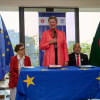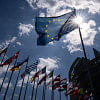EU wants Bangladesh to address human rights issues

The European Union wants Bangladesh to address the issues of inclusiveness of the political process, space for civil society and freedom of expression and media.
“In Dhaka, I have held various meetings devoted to a wide range of human rights issues, including core labour standards, an area in which Bangladesh needs to make urgent progress," EU Special Representative for Human Rights Eamon Gilmore has said in a statement following his visit to Bangladesh during June 10 and 11.
Human rights, including labour standards, are an important element in bilateral EU-Bangladesh relations, as well as in the trade relations under the "Everything but Arms" trade scheme,” Eamon Gilmore said, terming Bangladesh an important country for the EU.
During his visit here, Eamon Gilmore had meetings with Law, Justice and Parliamentary Affairs Minister Anisul Huq, Acting UN Resident Coordinator and country directors of ILO, UNHCR, IOM, UNDP, UNICEF, UNFPA, UN Women Country Directors, as well as with representatives of NGOs and trade unions.
He also visited the refugee camps, met Rohingya refugees and local communities, as well as with the Refugee Relief and Repatriation Commissioner Mohammed Abul Kalam in Cox’s Bazar.
Eamon Gilmore also discussed the aspects of rule of law and the law enforcement, elections, freedom of assembly, women’s and children’s rights, human rights cooperation in the UN, rights of minorities and the implementation of Chittagong Hill Tracts Peace Accord.
“The international community is grateful for Bangladesh's generous hosting of the Rohingya, and we as the European Union are doing our part to address the crisis,” he said.
Gilmore termed Bangladesh's hospitality for the Rohingya refugees, including by the host communities, as an example of solidarity for all of the global community.
The EU is making every effort to support Bangladesh in the important humanitarian mission, at financial and political levels and has mobilised € 104.5 million since 2017, the statement said.

 For all latest news, follow The Daily Star's Google News channel.
For all latest news, follow The Daily Star's Google News channel. 








Comments